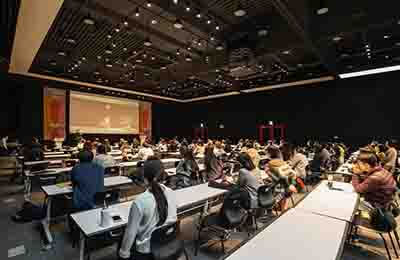演講技巧學(xué)習(xí)篇2
前言:本站為你精心整理了演講技巧學(xué)習(xí)篇2范文,希望能為你的創(chuàng)作提供參考價(jià)值,我們的客服老師可以幫助你提供個(gè)性化的參考范文,歡迎咨詢。

Eyecontact
眼神交流
Moveyoureyesslowlyfrompersontoperson,andpausetwoorthreesecondswitheachlistener;
眼睛慢慢地從一個(gè)移動(dòng)到另一個(gè)人,在每一個(gè)人身上停留兩到三秒鐘時(shí)間;
Lookatpeoplestraightorlookatthebridgeoftheirnosesorchins;
眼睛直視聽眾,或看著他們的鼻梁或下巴
Lookforthefriendlierfacesandsmileatthemonebyone,thenmoveontothemoreskepticalmembersandsmileatthemonebyonealso;
找到那些看起來比較友善的聽眾,逐次朝他們微笑;然后目標(biāo)轉(zhuǎn)向那些有些懷疑的聽眾,也逐漸朝他們微笑;
Imaginetheaudienceinbathrobesincaseyouarenervous.
如果你感到緊張,不妨想象聽眾都穿著浴衣的樣子。
Howtousethemicrophone
如何使用話筒
Youmustspeakupandprojectyourvoiceevenifyouareusingamicrophone;
即使是用話筒,也要聲音響亮并運(yùn)氣發(fā)聲;
Yourvoiceshouldberesonantandsustainedwhenyouspeak;
聲音要有回聲并能稍持續(xù)一陣兒;
Pitchyourvoiceslightlylowerthannormal.Listenerstendtoassociatecredibilityandauthoritywitharelativelydeepvoice;
音調(diào)要定得比正常講話時(shí)低一些,聽眾往往把可信度與權(quán)威性與一個(gè)相對(duì)低沉的聲音聯(lián)系在一起;
Trytoenddeclarativesentencesonalowtonewithout,however,trailingoffinvolume;
盡量用降調(diào)結(jié)束陳述句,但不要減弱音量;
Slowdown.
放慢語(yǔ)速。
Keynotespeech
基調(diào)發(fā)言
AKeynotespeechistooutlinethesubjectstobeaddressedbyotherspeakersatanevent,andtoestablishthetoneofameetingorprogram.
基調(diào)發(fā)言也稱主題演講,目的就是限定一個(gè)集會(huì)上其他演講者演講的主題,奠定一個(gè)會(huì)議或活動(dòng)的基調(diào)。基調(diào)發(fā)言也直接關(guān)系到確立大會(huì)的感情基調(diào)。
Whattosay
演講指南
Planwellinadvance;
預(yù)先計(jì)劃好;
Makesureyoufullyunderstandyourroleintheprogram;
保證自己充分了解在活動(dòng)中的角色;
Devotecaretostructuringyourspeechlogically;
認(rèn)真地構(gòu)思演講,使其結(jié)構(gòu)符合邏輯;
Devotecaretosettingthepropertone.
認(rèn)真設(shè)定適當(dāng)?shù)幕{(diào)。
Howtouseequipment
如何使用設(shè)備
Checklightbulbs,electricalpower,cableconnections,outletsandcontactstchesandanymovingparts;
檢查電燈、電源、線路的連接、插座和觸電、開關(guān)以及一些移動(dòng)部件
Confirmtwicethatallyourequipmentwillbeavailableonthetimeofthedaythatyouneedit;
保證設(shè)備能在你使用那天正常工作,至少要確認(rèn)兩次;
Arrangetohaveback-upequipmentclosebyandbepreparedtopresentwithoutvisuals;
準(zhǔn)備一些后備設(shè)備以防萬一,并做好沒有圖像資料仍能演講的準(zhǔn)備;
Remembertocarryyourequipmentandensureitwillnotbelost.
記得帶上所需要用的設(shè)備,不要弄丟了。
Typicalsignalsofnervousness
緊張的典型特征
Handsinpockets手放在口袋里
Increasedblinkingoftheeyes眨眼次數(shù)過多;
Failuretomakeeyecontact害怕眼神的接觸;
Lickingandbitingofthelips舔嘴唇和史嘴唇;
Fingertapping敲叩手指;
Fast,jerkygestures手勢(shì)又急又快;
Crackingvoices粗啞的聲音
Increasedrateofspeech講話速度加快;
Clearingofthethroat清嗓子;
Buttocksclampedtightlytogether臀部崩得緊緊的;
Thewaytoovercomenervousnessisbreatheindeepandbreatheoutslowlyforsometimes.
克服緊張的辦法是調(diào)勻呼吸,深吸氣,慢呼出。世界秘書網(wǎng)版權(quán)所有
HOWtodress
如何穿著得體
Darkcoloredsuitsordresses;
穿深色西裝;
Redtiesorscarves;
空樸素的白襯衫或上衣;
Blackshoes,freshlypolished;
戴紅色的領(lǐng)帶或絲巾;
Verylittlejewelry-worndiscreetly;
穿剛剛擦亮的黑色鞋子;
Calm,slowgesturesandslowmovements;
盡量不戴首飾,要戴的話要非常小心;
Shouldersback,chinup.
挺胸抬頭。
HOWtousegestures
如何使有手勢(shì)
Makesureallyourgesturesaresmoothandnatural;
所有的動(dòng)作都應(yīng)該流暢自然;
Don/''''tputyourhandsinyourpockets;
不要把手插在口袋里;
Letyourhandsandarmsdropnaturallytoyourside,gentlyfoldbothindesfingerstogether,withoutwringingorgrippingyourhandsinanyway;
將手和手臂自然地在身體兩側(cè)下垂,輕微屈起食指,不要扭在一起或緊握拳頭;
Letyourhandsdowhattheywanttodoaslongastheydon/''''tgobackintoyourpocketsormakeobscenegestures.
手想要怎樣就讓它怎樣,直到它不再回到你的口袋或在聽眾面前做一些惹人討厭的手勢(shì)。
Pointatimaginaryobjectsanddon/''''tpointatotherswithyourindexfinger;
手可以指點(diǎn)著假想的物體,不要用食指指著別人;
Sizeorquantitycanalsoeasilybeshownbyexpandingorcontractingthehands;
心寸的大小和數(shù)量的多少也可以通過兩手的擴(kuò)張和收縮來演示;
Gracefullyshowyouraudiencetheappropriatenumberoffingersbyholdingyourhandsata45degreeanglefromyourhead;
手抬起并與頭成四十五度角,優(yōu)雅地用手勢(shì)表示出數(shù)字;世界秘書網(wǎng)版權(quán)所有
TOemphasizephysicalsizesuchaslength,width,holdyourhandsoutinfrontyouwidelyaparttomovethemupanddown.
如果想要強(qiáng)調(diào)長(zhǎng)度尺寸的大小,將兩手伸向前方,盡量分開,并上下移動(dòng)。
